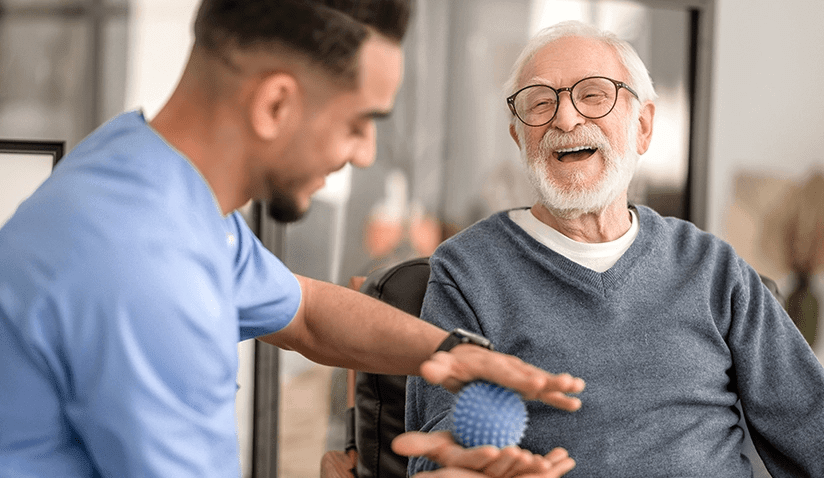Treating Severe Neurological Damage: The Remarkable Power of Early Rehab

Early rehabilitation is the multi-professional treatment of patients with severe neurological damage initiated as early as possible after an accident or illness. The early intervention aims to preserve or rebuild abilities such as speech, eating, and movement. Due to the severity of their condition, most patients require intensive medical monitoring in the beginning and are sometimes still ventilated. The department forms the interface between intensive medical treatment and rehabilitative treatment.
Treatment options for severely affected patients
Medical care at the highest level, innovative therapy strategies, and humanity - these are the foundations of a customized, individual treatment strategy. The goal is to provide patients with a new quality of life again through:
- Stabilization and improvement of the health status
- Recovery of basic daily living skills
- Avoidance or reduction of the need for nursing care
- Weaning from artificial ventilation with a tracheal cannula
Many patients in early rehabilitation achieve sufficient stability and independence after highly specialized treatment, progressing to the post-primary rehabilitation phase of the treatment chain.
In early rehabilitation, the treatment of severely affected patients is carried out after acute and post-acute consequences of brain damage, such as after strokes, craniocerebral traumas, or cerebral hemorrhages. Severe spinal and neuromuscular diseases, such as myelitis, Guillain-Barré syndrome, or critical illness polyneuropathy, are also treated. Patients in early rehabilitation are usually unconscious (sometimes also in a coma), require intensive medical monitoring, and are often equipped with tracheal tubes, feeding tubes, and bladder catheters. In addition, severe paralysis and speech, language, or swallowing disorders often exist. Weaning from mechanical ventilation is also a part of neurological early rehabilitation when other intensive medical treatments have been completed. Under intensive medical observation and treatment, time-consuming therapeutic care is provided to the most severely affected patients who are extensively supported by neurological-therapeutic nursing. The success of this treatment model justifies the high individual commitment for each patient.
State-of-the-art equipment and diagnostics
For patients in early rehabilitation, intensive medical monitoring and treatment measures are still required due to the medical severity. The various professional groups work together with the patients and relatives to restore vital functions, sensorimotor functions, and coordination, as well as mental, cognitive, and psychological functions. Ventilation beds, as well as intensive care equipment, are essential for this purpose. Comprehensive diagnostics are of great importance for further treatment. Fully equipped and modern neuroradiology departments utilize advanced MRI and CT, extra- and intracranial color duplex sonography, ultrasound, X-ray, neurophysiological diagnostics, and internal medicine diagnostics. Speech and language diagnostics, standardized physiotherapeutic and occupational therapy findings, and neuropsychological diagnostics complete the range of diagnostic services.
Therapeutic treatment in early rehabilitation
The therapy is composed of different areas. The therapeutic tasks of early rehabilitation involve mobilization, speech and language therapy, training chewing, swallowing, and eating, promoting motor and sensory functions, and improving alertness and cooperation. Due to the high degree of impairment in patients in neurological early rehabilitation, it is not uncommon for treatments to take place in teams or across different therapies.
Physiotherapy focuses on mobilizing the patient out of bed, regulating the muscle tone, promoting sensory awareness, building strength, and regaining independent movement.
Occupational therapy promotes the patient's abilities with regard to activities of daily living (e.g. personal hygiene, food intake, independence).
Speech therapy treats swallowing disorders (weaning from the tracheal tube to normal food intake by the patient themselves) and speech and language disorders (restoring the ability to communicate).
For the treatment of disorders of alertness, orientation, memory, or concentration, patients receive additional support from neuropsychologists.
Leading centers feature a multi-professional team of physicians from various specialties, therapists, intensive care nurses, and social services who are specially trained for severely affected patients. Special importance is also attached to activating care as part of the therapy.
Activating care by nursing staff
The task of the nursing staff is to activate and support the patient within the framework of nursing care in order to strengthen his or her independence in everyday life. This refers, for example, to alertness, participation in everyday life on the ward, taking over simple activities in self-care such as face washing, brushing the teeth, taking in food, or helping to transfer the patient to the wheelchair. Patients are encouraged to do as much as possible themselves, according to their abilities and resilience. A respiratory therapist from the nursing team supports the weaning from artificial mechanical ventilation by specifically promoting independent breathing.
Development and innovation
The implementation of early rehabilitation was pioneered as early as after the Second World War by Professor Friedrich Schmieder in taking care of war invalids who had suffered the most severe brain injuries. He was convinced of the human brain's plasticity and saw early therapeutic training as an absolute necessity. In 1974, he founded the first ward for vegetative state patients in Gailingen. Advances in trauma and intensive care medicine as well as in rescue services in the 1970s and 1980s led to a further increase in this group of patients.
Kliniken Schmieder opened the "Neurological Early Rehabilitation" department in Allensbach, Germany in July 1991 - the first of its kind in the country. It was established in close cooperation with the ministry and quickly became a model that set a precedent. As a quality leader, Kliniken Schmieder shapes medical-therapeutic standards, continuously developing them through its in-house research institute. Early rehabilitation is also available at Kliniken Schmieder Heidelberg.
Featured Blogs



